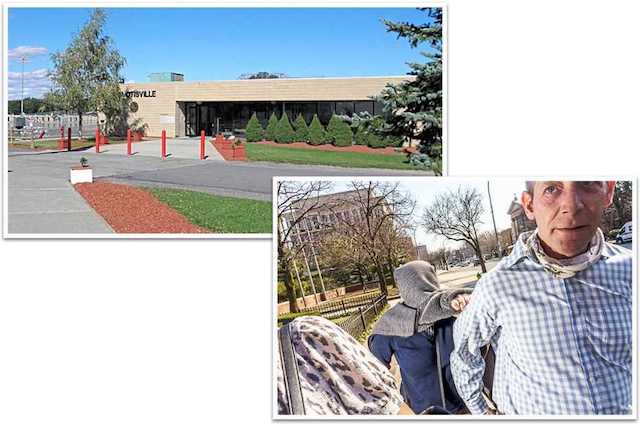The death of a patient led to the end of a scam that robbed Medicare for years.

A chiropractor’s office stole from Medicare for years. Here’s how crimes like this affect you
It was a Friday afternoon and Debbie Dillinger was hoping for a pain-free weekend. Car accidents had left the 47-year-old mother of three with chronic neck pain and headaches, and to deal with it she was visiting Dolson Avenue Medical, a clinic in Middletown, New York.
Around 5 p.m., Dillinger swung through the glass front door of the office. She checked in at a curved reception desk in the clinic’s large, open treatment area, where patients lay on massage tables and exercised on a variety of equipment. Behind the desk, a floor-to-ceiling mural of a waterfall, trees and a soaring eagle set a serene tone.
The clinic was run by two brothers, James “Jay” and Jeffrey “Jeff” Spina. For more than 30 years, they had worked in Middletown as chiropractors — medical providers who treat musculoskeletal disorders, commonly through manipulation of a patient’s spine.
On this day in March 2017, Dillinger’s treatment included something else. She was directed into one of the private rooms, where Charles Bagley, an M.D. and neurologist, would give her a facet injection. A facet joint, one of the locations where adjacent vertebrae meet in the spine, can become inflamed due to trauma like Dillinger’s. Injecting lidocaine into a joint can relieve the pain. But inserting a needle into the spine involves risk, and many experts say the injections should be used only as a last resort — and even then, sparingly, no more than eight times a year.
This was Dillinger’s third facet injection that month.
She climbed onto the examination table, rolled over on her stomach and pressed her face into a doughnut-shaped pillow. Bagley pushed a long needle into a facet joint in her neck and injected the medication. Dillinger’s body went limp. Bagley felt for a pulse. Nothing.
If you went to a chiropractor’s office with a sore neck, the last thing you’d expect is Dillinger’s fate: Taken away in an ambulance, she was dead within a week.
A Criminal Scheme Revealed
Dolson Avenue Medical had a good reputation among its many longtime clients. How could something so egregious happen under the watch of the Spina brothers, whose outside activities hinted that they had their community’s best interests at heart? Jay regularly made presentations to schoolchildren about the importance of avoiding drugs. Jeff distributed food to the homeless, coached youth soccer and basketball, and volunteered with the Salvation Army.
Five months after Dillinger’s death, however, the FBI showed up at Dolson Avenue Medical. Federal agents combed through the clinic’s files, cramming a white van with stacks of cardboard boxes containing confiscated medical records, handwritten notes and other material.
“Passed out after his Neck Injection. Got quite bad for a bit. We need to look into this.” ~ Jeff Spina email to Jay Spina about a patient of Charles Bagley’s, March 10, 2017 (one week before Debbie Dillinger’s final visit)
The raid was a shock to longtime patients, including Jacqueline Padilla, a retired New York City police officer who had been getting treatments at Dolson Avenue Medical for more than a decade. The place had a warm, family-like vibe, she told me. She loved that the clinic provided multiple services, including chiropractic and physical therapy. And she never had to wait for an appointment; she could walk in at any time and receive the treatment she was seeking for her back pain. “Nothing seemed out of the norm,” Padilla said.
But things were far from normal at the clinic. A year after the raid, the government announced that Bagley had pleaded guilty to conspiracy to commit health care fraud. With the disgraced doctor as a witness, the government charged Jay and Jeff Spina; their sister Kimberly Spina, who was a practice administrator; and business manager Andrea Grossman with defrauding insurance providers out of $80 million. Facing overwhelming evidence, the three Spinas and Grossman pleaded guilty to criminal charges relating to the scheme in 2019; they later were ordered to pay more than $28 million in total restitution.

Federal agents collected evidence from the Spinas’ offices in August 2017. MICHAEL RANDALL/TIMES HERALD-RECORD/USA TODAY NETWORK (2)
The Spinas’ practice appeared to be well run and respectable. But a multiagency investigation conducted by the FBI, the U.S. Department of Health and Human Services (HHS) and the Office of the New York State Comptroller revealed the depths of a massive, seven-year-long financial conspiracy. It was an illicit operation that raked in millions of dollars from Medicare and private insurance companies including Allstate, Nationwide and Travelers. And it was a scheme that put patients’ health at risk. “Some of them became unconscious” while undergoing treatments, said Susan Frisco, an HHS special agent. “One died.”
‘An Enormous Burden to Taxpayers’
The sad truth is that the crimes committed at Dolson Avenue Medical — crimes like double billing, unnecessary treatments and lethal malpractice — are anything but rare in our arcane and exploitable health care system. The Spina case is not an outlier; it is simply one example of an everyday occurrence. Health insurance fraud costs the U.S. economy an estimated $36.3 billion annually, according to the Coalition Against Insurance Fraud, an advocacy group comprising government agencies, insurance organizations, district attorneys, consumers and others.
Some experts suspect the losses could be substantially higher. “It’s a colossal waste of money and an enormous burden to taxpayers,” said Malcolm Sparrow, a Harvard University fraud control scholar and author of the book License to Steal: How Fraud Bleeds America’s Health Care System. “Medicare costs go up, resulting in higher taxes and higher copays. The bleeding goes on, year after year after year.”
When I first came across a press release about the Spinas’ illicit operation and Dillinger’s death, I was astonished. How does something like this happen? How can it go on for years before authorities put a stop to it? To investigate, I combed through thousands of pages of legal documents; attended multiple court hearings; interviewed health, legal and law enforcement experts and witnesses; and corresponded with the imprisoned Jay Spina, whom the government deemed the mastermind of the operation. As a result, I’ve learned not only how easy it is to cheat Medicare and other health insurers but also what some people will do to enrich themselves this way, often putting others at grave risk.
Behind the Scam: A Chiropractic Dynasty
Chiropractic has been a family affair for the Spinas going back more than five decades. Jay and Jeff’s father, James Spina Sr., opened a chiropractic clinic in 1968 in Liberty, New York, a Revolutionary War–era town about 100 miles northwest of Manhattan. James’ four sons — Jay, Mark, Jeff and David — all followed his career path. A local newspaper story once counted eight chiropractors in their extended family, with a total of 225 years of experience. “Spina,” appropriately enough, is Latin for spine.
“My dad practiced the old-fashioned way,” Jay wrote to me in a letter. “People paid what they could afford, or what they felt was right.” He said his father often told him, “Your right hand is your service hand, and your left hand is your money hand. Always make sure you lead with your right. When you lead with your left, you have gone off the rails.”
In 1986, the family expanded the business, opening the office in Middletown, about 65 miles from New York City. Jay ran the business operations. Jeff became Jay’s partner.
Jay had a vision for the business that went well beyond chiropractic. “Patients would return to the office and say, ‘You guys do this so good. … You should do physical therapy and rehabilitation services here,’ ” he told me. But under New York state law, chiropractors are licensed only to treat spinal misalignments; they can’t employ other types of health care providers or benefit financially from referrals.
It appears that the Spinas abided by that law for some 25 years. So why, in 2011, did they decide to cross the line? Was it an honest desire to do more for their patients? Or the most basic of all motivations, greed? There is evidence for both, but what’s clear, according to prosecutors, is that in 2011, the Spina brothers came up with elaborate schemes to circumvent the law, setting up corporations in the names of medical doctors and other health care providers. Court documents show the Spinas ran those businesses as if they were the owners and the owners were the employees — a violation of the state law permitting only medical doctors to operate medical practices or employ physicians.
Indeed, the evidence shows Jay and Jeff retained control of everything, administering each business and doling out performance bonuses to the owners-in-name. Office manager Grossman, who declined to be interviewed, helped set up and manage bank accounts for the nominal owners of the businesses. Jay directed office staff to hide the brothers’ connections to these other businesses by using variations on the Dolson Avenue address. Money was shifted from those corporations to ones owned by Jay and Jeff, disguised as rent payments and marketing fees. Jay benefited the most; one court document shows he and his wife received $4 million in disbursements to their company, Effective Marketing.
“If there is an audit by Medicare there is no way out of this one.” ~ Jay Spina email to Jeff Spina, Jan. 3, 2013
In addition to illegally operating all the businesses, the brothers engaged in other practices that are the pillars of medical fraud. They billed for services they didn’t render. They charged two different insurance providers for the same procedures. They provided treatments that weren’t necessary or effective. (The facet injections that Bagley gave to Debbie Dillinger, for example, weren’t medically justified, according to a medical expert who reviewed her records.) And they falsified medical records to back up their claims. “These are common themes in our investigations,” HHS’s Frisco told me. “Maximizing profits,” she said, was the focus of the Spinas’ practice.
In a 2013 email, Jay cautioned Jeff about exorbitant billing. “I think you had better keep a closer watch on this,” he wrote. “If there is an audit by Medicare there is no way out of this one.”
While the brothers were growing richer, court documents show that their sister, Kimberly, received an hourly wage of about $16 for her part in the scam, which involved preparing fake medical reports and doctoring workers’ compensation claims. Kimberly, who declined to speak with me, is a recovering alcoholic who flunked out of chiropractic school, according to her lawyer. She told prosecutors that she believed her job prospects outside the family business were probably nonexistent.
As the years progressed, the Spinas’ businesses grew to around 30 staff. They moved out of their original location and into a larger, newly remodeled space in a building in a strip mall just a mile away, and offered a range of services, including physical therapy, rehabilitation, acupuncture, massage and medical pain management.
“Jay was charming,” said ex-NYPD officer Padilla, “always professionally dressed — a suit guy. Even when he was on the go, he’d stop and talk and start treating somebody, rubbing their back or using one of the massage machines.” Jeff, comfortable in polo shirts and sneakers, was, according to Padilla, the quintessential hardworking middle child, “the machine” who kept the operation running.

RYAN INZANA
In front of their patients, the brothers were smiling and good-natured. But behind the scenes, they often clashed. In a letter to the court, Jeff, who declined to be interviewed for this article, wrote that he knew his brother was extracting most of the medical profits through a management company: “We had many heated discussions and fights regarding his lack of transparency — in the office, in front of staff and at his house many times, when his wife had to separate us.” Chiropractor Steve Brune, a witness to their office battles, wrote in a letter to the court that Jay usually won those fights: “Jeff didn’t stand a chance when it came to disagreements with his brother.”
In interviews with investigators, staffers described how patient treatment was often based solely on how much the Spinas could extract from Medicare, no-fault insurers and workers’ compensation benefits. Patients were referred between the bogus health care companies, and insurance claims were spread out to avoid attracting attention from providers on the lookout for fraud. The brothers encouraged staff to meet certain billing targets, regardless of whether treatments were medically necessary, dangling weekly “bonus plans,” such as movie tickets, free lunches and other rewards, for hitting those profit goals. Prosecutors said the Spinas also negotiated illegal kickbacks with suppliers of goods and services, like back braces and magnetic resonance imaging scans (MRIs). They even taught employees how to lie to insurance companies to get approval for these MRIs — and get their kickbacks.
Not everyone at Dolson went along with these activities. In an email to Jeff, one doctor complained that Jay and Kimberly were pressuring him to create exaggerated reports that would guarantee unlimited insurance company approvals for therapy. “There are lines of honesty and professionalism in producing documentation I will not cross,” he wrote, “and I want the threats of being fired unless I do so to stop immediately.”
Even a former patient told the FBI that they had realized something might be fishy when they received paperwork about claims from care providers they’d never seen, inconsistent copays and unfamiliar bills sent to collection agencies. That patient described the clinic as a “mill” that shuffled them through as many treatments as their insurance would cover.
A System Vulnerable to Fraud
How could such fraud go on so long without the perpetrators being caught? It’s easy, said Sparrow, the Harvard fraud expert. In the U.S. health insurance system, it’s standard for claims to be paid first and checked for validity later — if they’re checked at all. “The resources available for tracking down fraudulent and abusive providers are so tiny compared with the probable scale of these problems,” he said.
Swindlers capitalize on the fact that automated payment systems check claims for medical orthodoxy, not authenticity. As long as a claim appears accurate—the procedure code matches the diagnosis and the price is commensurate with the treatment — you can get paid for entirely faked medical procedures. The Spinas took that into account on several occasions when they were audited by Medicare, the New York State Comptroller’s office or private insurance companies, according to investigators: To cover their tracks, the brothers assembled a special “audit team” of their employees to manufacture medical records that files lacked.
Ironically, control systems set up to detect inappropriate billing teach criminals how to be better crooks, said Sparrow. If, for example, a provider submits a claim for a service that isn’t justified by a patient’s diagnosis, the provider will receive a computer-generated notice explaining why that claim was denied. “It’s very nice,” Sparrow said. “A reasonably clever crook watches it very carefully for these reasons and stops repeating any of those mistakes.”
The ‘YouTube Expert’ Performs Complex Facet Injections
When Charles Bagley joined the Dolson Avenue Medical team in the summer of 2016, he was, in many ways, a broken man, reeling from a bad divorce, a bankruptcy filing and a U.S. Drug Enforcement Administration investigation that had cost him his license to prescribe narcotics.
Not surprisingly, Bagley welcomed his new salaried job — one that would release him from the stress of running a medical practice. At Dolson Avenue, all he had to do was wait for the patients to come in. In exchange, Bagley brought a new procedure to the practice’s list of insurance-covered treatments: facet injections.
At a minimum, people who administer facet injections should have three months of daily and direct training with a physician already well versed in the procedure, according to an expert consulted by the HHS inspector general’s Office of Investigations. Bagley had no formal training, according to prosecutors, alleging that he taught himself by shadowing other doctors and watching YouTube videos. What’s more, Bagley was injecting patients with a concoction he devised himself: a combination of lidocaine, a sugar solution and ingredients the expert considered “unusual.”
The results could be horrific. In December 2016, one patient being treated for neck, back and shoulder injuries received an injection of what Bagley called his “special mixture,” she later told the FBI. She felt an “electric shock” shooting down her left arm and cried out in pain. When she left the clinic that evening, she couldn’t walk without assistance. She was dizzy, numb and in pain from the neck down, according to her account. Months after the incident, she was still experiencing pain and numbness, and was forced to quit her job as a home health aide.
In early March 2017, another patient passed out during an injection from Bagley. An employee at the clinic told the FBI that Jeff had refused to let the staff call 911 because he didn’t want the police to come. After the patient was resuscitated with CPR, Jeff emailed Jay. “Got quite bad for a bit,” he wrote. “We need to look into this.”
Seven days after that email, Debbie Dillinger walked into the clinic for her third facet injection that month. Bagley should have used an X-ray with dye to guide his needle, according to an expert report; he used ultrasound instead. He used far too much lidocaine, according to the expert who reviewed the incident. And, as Bagley acknowledged to me when we spoke on the phone about what happened, injections in the neck can be particularly risky. “I shouldn’t have been doing the injections in that area.” He wasn’t prepared for such an emergency, he said.
After his mother’s death, Dillinger’s 29-year-old son Aaron lashed out on Dolson Avenue Medical’s Facebook page: “My mother entered this facility at approx. 5pm to receive a lidocaine injection from DR. BAGELY. Shortly after receiving her shot, my healthy 47-year-old mother was dead. She was promised pain-free treatment, and she got just that. Now she’s f—in gone forever, and her three sons and husband are left without a mother/wife. A big F— YOU to Dolson Avenue Medical.”
Alarmed by the post, Jay tried damage control. His attorney sent Aaron a cease and desist notice. Bagley’s practice and the Spinas’ Dolson Avenue Medical “are not affiliated in any way,” the attorney wrote. “Please be advised that legal action will be commenced against you in the event that it is discovered that you made even one negative disparaging or false statement … or disrupt our client or Dolson Medical’s practice in any way.”
It turned out that even before Debbie Dillinger’s final facet injection, undercover FBI agents, tipped off by a confidential source about suspicious billing, had been trying to get a close look at the Spinas’ clinic. One agent showed up seeking treatment for trauma supposedly suffered during a car accident. He checked in, went to the bathroom and left without ever seeing anyone. His insurance provider was billed for two treatments.
Not long after Dillinger died, the FBI reached out to Bagley to ask about the Spinas and his work at the clinic. Fearing criminal charges for his role in Dillinger’s death and hoping he could gain some leniency, Bagley agreed to wear a wire to gather more material for the FBI’s probe. His cooperation soon turned fruitful, gathering evidence of even more wrongdoing: a plot to transfer ownership of a company the Spinas secretly controlled by backdating a sales contract and forging the signature of a dead business partner. The FBI raid of the Dolson Avenue office came soon afterward. Within two years, all the people charged in the Spinas’ scheme had pleaded guilty.
In mid-2021, four years after Debbie Dillinger’s death, Bagley was sentenced to a single year in jail and ordered to pay $360,000 in restitution. (A legal filing shows that the court was petitioned to permit a settlement award of $487,500 in a civil lawsuit brought by the Dillinger family.) When I last emailed with Bagley, he had moved to Duluth, Minnesota, and was taking a course to become a truck driver.
Jay Spina was sentenced in April 2021. More than 75 of his supporters, including schoolteachers, former patients and his daughter’s boyfriend, had written letters or submitted video testimony, pleading for leniency from federal judge Kenneth M. Karas of the Southern District of New York.
Jay didn’t get it.
Judge Karas called him a “Jekyll and Hyde” who, alongside his charitable work, committed “a massive, long-running, callous fraud” to squeeze money out of the health care system. Although the insurance industry was the victim of the wide-ranging scheme, Karas said the biggest loser was “everybody who gets medical care, because those costs just get passed on.”

RYAN INZANA
Elements of the case, Karas said, made his blood boil. Most of all, even after Bagley’s injections caused adverse reactions in several patients, Jay had encouraged “the YouTube expert,” as the judge called Bagley, to keep doing the procedure: “Did he say … ‘Bagley, maybe you should stop’? ‘Maybe we’re not really qualified to do this’? ‘Maybe we should find other ways to make money’? Nope.”
Furthermore, the judge continued, Spina had the gall to say he had nothing to do with Bagley, and to retaliate against Dillinger’s family.
The sentence Karas handed down: nine years in prison. Restitution: $9.76 million.
Jay was incensed. “The government offered Dr. Bagley a legal bribe,” he told me in an email from prison, “allowing him to plea while pointing the finger at me to avoid facing manslaughter charges that would likely have resulted in him dying in federal prison.”
At Grossman’s sentencing, Karas asked, “Who wants to sentence a grandma to jail? Nobody.” And yet, he said, “the law doesn’t immunize grandparents from dealing with the consequences of their conduct.” She received a year in prison and was ordered to pay $9.1 million in restitution.
Kimberly Spina, Karas decided, had played a minimal role and had provided the government with helpful information. He sentenced her to two years of supervised release and $1,550 in restitution.
Five days before his arrest in August 2018, Jeff Spina posted on Facebook, “Karma: Think good thoughts, say nice things, do good for others. Everything comes back.”
After his arrest, Jeff worked toward that karma by cooperating with the Justice Department, talking not only about the Dolson Avenue conspiracy but also about other health care providers allegedly involved in illicit activities. Aware that Jeff was working with the Feds, family members cut him out of their lives.

Above: The prison where Jay now lives. Below: Kimberly hides her face after her sentencing. FROM TOP: BUREAU OF PRISONS VIA AP; MARK PETERSON
At Jeff’s sentencing last October, Karas scolded him for his role in fraud with the ripple effect of making health insurance unaffordable for many Americans. The costs “get spread over all of the people who are insured by those companies,” Karas said, “because to the extent that they don’t recover the millions of dollars that were stolen here, somebody’s got to pay for that.”
Acknowledging Jeff’s cooperation, Karas ended up sentencing him to three years of supervised release and a restitution payment of $9.76 million. “He’s now committed to new life outside of health care,” Jeff’s attorney, James Monroe, told me afterward.
Jay now lives at the Otisville Federal Correctional Institution’s prison camp, a 20-minute drive from his old office. If he serves his full nine-year sentence, he’ll be 72 years old upon release.
Today the Dolson Avenue clinic operates under the direction of the brothers’ younger sibling, David, who was never charged with wrongdoing. The clinic has a new name, though: Pain Relief & Wellness Center. Ex-cop Jacqueline Padilla still goes there. “David is just as friendly and caring,” she told me. “I still get the same treatment.”
Written by Rene Ebersole for AARP ~ June 06, 2023
